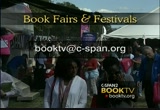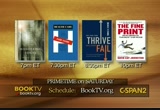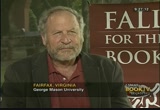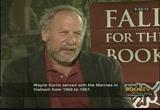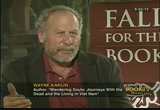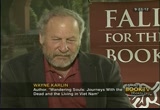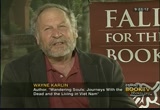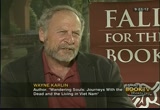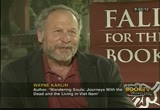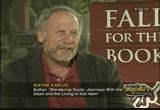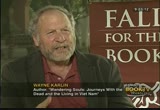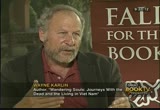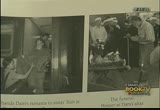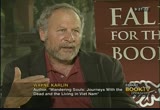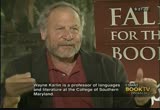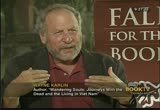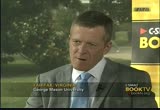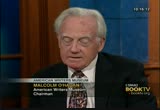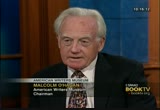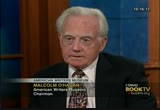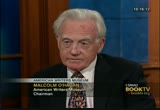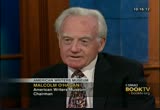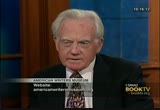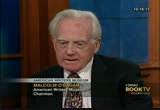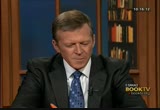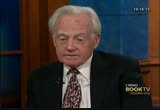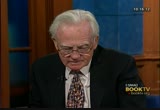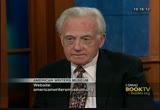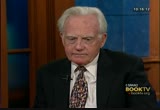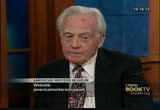tv Book TV CSPAN November 10, 2012 7:00pm-7:30pm EST
7:00 pm
7:01 pm
some firms fail. this week david k. johnston diss his book "the fine print" how they use plain i english to rob you blind. visit booktv.org for more information in an interview taped outside of washington, d.c., wayne karlin talking about his book wandering souls which is an account of the u.s. soldier return to vietnam to return a notbook he took from a soldier he killed during the north vietnam war. joining us now on booktv is author and professor wayne karlin who most recent book is "wandering soul." professor karlin who was homer?
7:02 pm
>> he is a friend of mine who retired living in north carolina. he was a officer platoon leader in the vietnam war. and he had contacted me a number of years ago because i had some contacts in vietnam vietnamese i had been working with, he had taken a documents and a book from the body of an vietnamese soldier he killed during the war. and wanted to see if he could find a family and return those documents to this them. >> why. he had gone through decades of ptsd, not only because he killed that man, he had a rough war, he killed many people he had seen many of his own men killed, went through a lot of the pat earns that people tend to go through
7:03 pm
with post-traumatic stress, an adrenaline junkie. he wrecked card, he -- cars, had had a hard time forming relationships. he got married kind of late and his wife was a army brat and seen he was going through the flashbacks, et. cetera, and he remembered that he had said things to his mother and she put him in attic. he blocked the book out of his mind for thirty years, his mother had his letters she had also taken the dairy he had sent and put this in the attic. he went through the letters at the suggestion of his wife and found the book again. it brought it all back to him. at that point he thought you know what can i do? , i mean, here is down -- documents this family might have
7:04 pm
known what happened to the man i killed, if i can find him and bring it back, it will be something too bring them to peace and help himself heal. >> why did he take the documents and book. what kind of book or man script was it? he had taken a patrol on the ridge line which is the province of vietnam, and he had gone a little further down the trail to check it out, the an man he shot was coming up the trail on the other side and he was startled to see him. homer had his rifle like this. he had a rifle over the shoulder and homer yelled at him, give up, surrender, he started to take his rifle down and homer stitched him three rounds in the chest. he went over to the body, took
7:05 pm
out went through his pocketses and found this book and other documents, the book was full of medical drawings. there were notes in it it was full of medical drawings and notes. it turned out he was an medic. for homer, he had been in combat he had shot at people and killed them. he had never come face to face with like that with anybody. you try not to see the humidity -- humanity of the people trying to kill you or you have to kill. looking in the book, the drawings were done so meticulously. it was preserved in the middle of the jungle, the notes were neat, it gave the humanity to the person he killed that he resisted. he didn't want to see him that way. but he took the documents back
7:06 pm
and what you're supposed to do is give them to the intelligence office as to assess them and burn them, and something him said don't burn theetz. give them back to me. he got them back and sent it to his mother and tried to put it out of his mind. it. >> you say he forget or blocked it. >>. >> he blocked it.. was he surprised when he found it? >> he was surprised, he was very, -- it brought him back to that moment. it brought it him back not just in memory but sensely also. what he smelled, what he felt emotionally at that time. >> what are your contacts in vietnam that you refer to earlier? >> i was in the marine corps. in vietnam during the war, i became a writer after wards. i was in a program a number of years ago early '90s at the university of massachusetts
7:07 pm
where american authors who were veterans of the war met vietnamese authors who were on the other side of the war. we lived together for a summer. these are people who would have killed each other at one point. and they had life paths that followed ours. they became writers after wards. i made deep friendships that summer, and out of that, we decided to create tbrord from word from vietnam -- what they were doing after the doing after the war and what americans had done after the war. do that i had to go to vietnam. it was the first time i was back since the war. >> and what was that experience like for you? >> it was very emotional roller
7:08 pm
coaster. it was good because i'm with the people and they are friendly with me. and everyone was friendly to me. it's a experience that a lot of? veterans have, you see the country at peace. there were moment it is became emotionally trying, there were moment of a healthy grief that i could let things go. and then seeing the work getting the word translating to the vietnamese writes we did a series of their books, you know, i'm a writer, i mean, that's the way i get in to somebody else's head. that's the way try to do with my own books. and this was an intimate relationship on those levels, on the levels of this commonality of being writer and what they wrote about and the personality so i'd be doing that about ten times by the time i -- homer
7:09 pm
contacted me. >> why the name "wandering souls ?" >> it is the vietnamese concept that if some -- if the body or some object from the person who was killed or some part of that person is not -- if that person dies violently or in some way that is unnatural, if that's not returned to the home village if the body buried or some part put on the family alter, the person's soul will forever wander. if vietnam they have 300,000 missing like that. so they are considered wandering souls. it was thats aspect of it. he was a wandering soul that had to be brought back to his home and village. they were also so many of the veterans of that war, the living veterans of with a -- that war
7:10 pm
who had not come home even though they were physically home. >> did homer, did you get him in touch with the ?eam. >> yes. i with journalist i knew in vietnam, we scanned the documents and sent them to them. they put it in the newspaper, several of the big newspapers, actually, and what happened, came dom came from a little village. and his sister actually had wrapped fish in a newspaper and she opened it up and saw, you know, there was not the picture. we didn't have a picture of him at that time. but just the picture of the document, his name and so on. she went running out of her house saying dom has come home. the family got in touch immediately with the journalist who immediately got in touch
7:11 pm
with us. and they said, there's a number of brothers and sisters, the parents were dead. a number of brothers and sisters a number of who had been in the war also, they said we have no bitterness toward homer, we understand war and we understand soldiers were grateful that these things were kept and we invite him to come and . >> did you attend the trip. >> why yes. i attended two trips. >> now we are going to show three pictures while you tell us of briefly the stories. >> the first trip homer did not go back. he actually said he could not do it. he couldn't face them. and i was going anyway on a different project, so he said would you take them to the family. i took the document to the family. it was -- i thought it would be
7:12 pm
a small private ceremony. not unking that in that village there had been almost 200 like dom that hadn't come back. when he followed the sam out there and i walked in to the village with the documents in my hand, it was like hundreds of people and wearing like it was a funeral. it was overwhelming. and we had the ceremony, they took it back, went to the family's house and had dinner with them. it was very warm. but they said, please, you know, tell homer to come. three years later, he was ready to do it. so 2008, we both went back. it was his first time in vietnam since the war also, and a few days after he got there, we went out to the village, and it was, you know, very obviously very emotional for all of us especially for homer and for them. and he came back, the documents
7:13 pm
had been put on the family tarl. you light incense and pay respects. they said his soul is back. but they said there's something you can do for us, they said, we have tried to find his body, and they knew that the body had been picked up after the ambush and put in an unmarked grave with 36 other guys, so they had gone there and tried to find it. there's a great belief in medium and vietnam. didn't work out. they said, if you go with us, you know, we have this medium, if you go with ask us we'll be able to locate the body and bring him back. okay. homer was more ready to believe it than i was. he's from south carolina. and he grew up in, you know, going to baptist church, okay, that's what you have to do.
7:14 pm
that's what you have to do. we traveled with the family back to the killings grounds, back to the place where they were. and to make it short, we found the grave. and when they found the body, they found several on jet -- on jets nailed it that it was dom, they basically cleaned the bones but them in -- put them in a small box. we were travel big car and train. we went up north and had a funeral. and this -- there were hundred of people that brought the notebook back, now there were thousands. and they funeral ceremony and homer became one of the casket barriers. it's one of the picture in the book. i have an image of him -- the other casket barrier bearers are
7:15 pm
vietnamese uniform. there were people wearing that. and it was their uniform. he's carrying the weight of, you know, the guy he's killed, and excuse me, we had a procession about a kilometer to the graveyard, and we buried him. my thoughts in doing all of that was, you know, with trauma, you bury the bad stuff. and in order to heal from that, you have to dig it up and commemorate it and, you know, put back in theth and -- earth and we had literally done that. it's like we were burying the war. >> wayne karlin teaches language and literature at the college of
7:16 pm
southern maryland. he's a novelist inspect is a non-fiction book "wandering soul: journey with the dead and living in vietnam." thank you. every weekend booktv offers 48 hours of programming focused on non-fiction authors and books. watch it here on c-span2. you're watching booktv on c-span two. and joining us now in the sphiewd koa why malcom the founder and chairman of the foundation of the american writers museum. mr. o'hagan very quickly, what is the american writers museum. >> guest: it may be a future home for the booktv studio among other things. seriously, it will be a place where people will come and engage with writers and writing. in ways they never been able to do before. it will be the first national
7:17 pm
museum dedicated to celebrating our bringers and helping people understand the impact they've had on the culture and history, our daily lives. >> host: we spoke to you about two years ago and the concept was getting off the ground. what's the progress you've made. >> guest: let me thank you for having you back on. i appreciate that, and have welcomed the opportunity to bring people up to date on the project. we have made lot of progress. and i really judge that not by what we saw but others say. they are impressed. we have started off we have pretty much established beyond doubt it's a worthied endeavor. the concept is solid. we have enthews yaysic -- enthews yaysic support. and viewers will see the endorsement at the website.
7:18 pm
we have an executive planning team in place. the national advisory coibl. we have created a let rare council in chicago to help us there. that will be -- excuse me. i have completed the initial plan for the museum. we have a business plan in place that we have received grants from a number of foundations private and public including a grant from the national endowment from the humanities that allowed us to develop the concept plan. we have engaged one of the leading museum effects pert to help finalize the business plan and analyze the sites in chicago. we have engaged fundraising consult assistant to help develop that. >> host: why chicago. why is that going to be the physical home? >> guest: we set a number of
quote
7:19 pm
criteria. that a large city. a destination city. a city that is rich in philanthropy. a city with a long literary heart tinge. many places meet that. it has added advantage of being central. it's a wonderful city. most people think chicago is a good choice.
7:20 pm
millennium park. close to the art institute and the semp any. an ideal location. has been a starting place for other museums. we would be house there had for a number of years while we go on the ultimate home for the museum.
7:21 pm
and important sentences statements, titles of books or whatever. and that will immediately engage people with the word. and from there you with go in to what we call a writers hall and it will have a series that will dell different topics. and the topic could be american quest, families, towns and each of these areas we will have a very engaging interactive exhibit and it will feature works that are appropriate for that particular topic. it i it starts with lewis clark. and moe by dick it would follow jack on the road. and we have a map there that you'll be able to trace the map. where they got the idea and how they developed them.
7:22 pm
what is significant about the particular work? somehow it shaped america and our thinking about who we are? then we would have a series of special exhibit halls. obviously very exciting. one for children you'll hear lots of squeals of clieght delight as they engage with the favorite characters from the children book. we have poetry corner. one way, that could be a darkroom that you enter and sit there in quite and you hear the poets voice and then images of the context in which the poet or the poem has been set. for example, we -- [inaudible] you hear brooks reciting that and you see the guys in the pool hall. you are in the pool hall with them. these are the sort of ideas. we want to make it engaging and fun and inspirational.
7:23 pm
>> host: what about non-fiction? >> absolutely feature non-fiction. we are a country that is found on the written word started with the we hold these truths to be self-evident and the constitution and propagated with the gettysburg address and the speeches of martin luther king and others. these are fundamentally important to defining the country and who with we are and inspiring words. biographies are very inspiring and history. so all of these forms of writing writes poets with they will be futured in the museum. who and how will be determined by people more knowledgeable than all of these thing will have to be cure rated in time by creative and knowledgeable people. >> what's your background and
7:24 pm
how did you get started on this? >> i'm an engineer by training. i spent my career in business. i grew up -- i have a love of literature and after retiring had a chance to pursue my passion which is literature, and found when visiting [inaudible] the writers museum and found doesn't exist here. that's what we got started down the path, and very quickly found that people thought it was a worthy idea and surprised it doesn't exist already and encouraged us to go forward. and, you know, this is a major project. this is a marathon. it's not a sprint. i'm wearing my marathon tie to remind me. i've run a number of marathon. there are times you say why am i doing this? i want to quit then the people along the way are cheering you on, and that's what is happening with the project. right from the start people have been cheering me on. >> who are some of the people cheering. >> we started with the literary
7:25 pm
community, the poetry society of america, the poetry foundation, the center for fiction in new york, new york public library, the library of congress, all of the major institutions in chicago, the president of the major university of chicago have endorsed it. the mayor very enthusiastic. big reader. loves the idea. i got a nice endorsement from the governor of illinois, which was nice. he endorsed it. and chairman of the national endowment for the humanity. a lovely comment. could i tread? ting gets to the essence of why it is important. and he says in a country established as an idea explicated in written documents and embellished by generations. the case for commemorating the written word is self-ease. after all what is written describes people and what is
7:26 pm
celebrated he diswiens the value. enter. >> who wrote that? >> this was mr. leech. the chairman of the national endowment. >> former congressman. >> and long time congressman from iowa city and one of the most respected members of congress. how much money do you project the project will cost? the budget is $35 million, and that to develop the initial space. it will be about 30,000 square feet. phase two will be another $15 million and phase three $15 million and $20 million for and endowment to ensure that the museum is sustainable. that's the issue today with museum. you can start with a bang then you go out with a whimper. we are determined this museum is
7:27 pm
going to be around far long time. part of the planning and business plan has to ensure that. >> 30,000 square feet. can you give us a comparable space to give us an idea how big it is? >> well, the 30,000 square feet, half of that is exhibit space and half is a, you know, for the shop for the social areas and so on. and i would say it's comparable the history museum in chicago. here in washington, probably international spy museum. which is actually one of the spy museum. it's a model because it's fun and engaging place for people to go to. that would be a couple of examples. >> malcom, o'hagan it's october 2012, we're taping this interview. you are you in the process right now?
7:28 pm
>> we just about all of the foundation downs in place with the business plan and the concept plan. by the end of the year we will have the five analysis completed. by end of the year we will have the fundraising strategy in praise, and -- place and we will be ready to move forward with the next face, of course, which is the fundraising. starting to develop the exhibit idea in more concrete term. i should have mentioned that actually at the website we have our first online exhibit. and very much encourage the viewers to go there. it was inspired by the fact we had leaders meetings in the united states this spring and thought it would be interest to look at what american writing influenced them. and they're basically three parts to the exhibit, so that is one. looking what is influenced the foreign leaders. we have 3 of the leading authors we asked them what american
7:29 pm
works they would recommend to american leaders to better understand america? wonderful recommendation and why. we asked them what foreign authors have influenced their work. and we have also them, you know, how they really originally inspired to write. and so you have tc boil, a lot of wonderful writers are featured in that. i urge your viewers to check it out. and also people that goo to the website can make their own recommendations on what they think foreign leaders should read. >> american writers museum.org is the website. you tweet out on a regular basis. we will put the twitter handle as well. malcom o'hagan can people donate to the american writers museum at this point? >> we talk two years ago, they could not. we didn't have a donate buto
129 Views
IN COLLECTIONS
CSPAN2 Television Archive
Television Archive  Television Archive News Search Service
Television Archive News Search Service 
Uploaded by TV Archive on

 Live Music Archive
Live Music Archive Librivox Free Audio
Librivox Free Audio Metropolitan Museum
Metropolitan Museum Cleveland Museum of Art
Cleveland Museum of Art Internet Arcade
Internet Arcade Console Living Room
Console Living Room Books to Borrow
Books to Borrow Open Library
Open Library TV News
TV News Understanding 9/11
Understanding 9/11